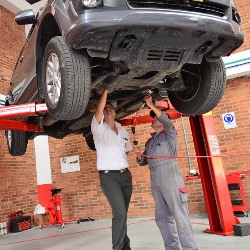How to Select the Best Vocational School Training near Anderson Missouri
 Choosing to begin a new profession and enroll in a vocational school near Anderson MO are serious decisions that will profoundly affect your future career. But with so many vocational schools to choose from, exactly how do you approach locating the ideal one? Not only do you have to confirm that you will obtain the extensive training required to be successful in your new occupation, but also that the school is highly regarded and reputable. A number of students make the error of choosing a trade school simply because the campus is nearest to their residence or where the work. Others might gravitate to the school that charges the lowest tuition. Of course the cost and location of the training are critical factors when evaluating trade school options, but they should not be the sole ones. Added variables such as reputation and accreditation of the schools are critical also. So prior to beginning your evaluations and comparing trade schools, you will need to know what questions to ask so you can get the information to make a final selection. We will cover a few of those questions shortly in this article. But to start with, let’s talk about some of the trade options that are offered including the accessibility of online programs.
Choosing to begin a new profession and enroll in a vocational school near Anderson MO are serious decisions that will profoundly affect your future career. But with so many vocational schools to choose from, exactly how do you approach locating the ideal one? Not only do you have to confirm that you will obtain the extensive training required to be successful in your new occupation, but also that the school is highly regarded and reputable. A number of students make the error of choosing a trade school simply because the campus is nearest to their residence or where the work. Others might gravitate to the school that charges the lowest tuition. Of course the cost and location of the training are critical factors when evaluating trade school options, but they should not be the sole ones. Added variables such as reputation and accreditation of the schools are critical also. So prior to beginning your evaluations and comparing trade schools, you will need to know what questions to ask so you can get the information to make a final selection. We will cover a few of those questions shortly in this article. But to start with, let’s talk about some of the trade options that are offered including the accessibility of online programs.
Vocational School Career Options near Anderson MO
 There are a number of professions to choose from in vocational schools that offer fulfilling and good paying careers. Perhaps you have already decided on one that you have for years desired to pursue. For example, maybe you have always enjoyed working on your car and have considered using that talent to earn a living as a car mechanic. Or perhaps a relative has had a long and successful career in a specific trade or vocation and you would love to follow in her or his footsteps. No matter what your inspiration is for entering a trade, there is probably a program offered that will give you the training that you require. Following is just a modest representation of the trade school programs that are available in the Anderson MO area.
There are a number of professions to choose from in vocational schools that offer fulfilling and good paying careers. Perhaps you have already decided on one that you have for years desired to pursue. For example, maybe you have always enjoyed working on your car and have considered using that talent to earn a living as a car mechanic. Or perhaps a relative has had a long and successful career in a specific trade or vocation and you would love to follow in her or his footsteps. No matter what your inspiration is for entering a trade, there is probably a program offered that will give you the training that you require. Following is just a modest representation of the trade school programs that are available in the Anderson MO area.
- Automotive Technician
- Heating and Cooling (HVAC) Tech
- Plumbing
- Electrician
- Welding
- Truck Driver
- Aircraft Maintenance Tech
- Lab Technician
- Construction Manager
Each of the programs will have differing completion times and costs based upon the vocation, type of credential and school. Many of the programs may be completed in a few weeks, while others will necessitate months or even 2 or more years of training. Each of these variables must be considered prior to selecting a vocation and school.
Click Here to Get Free Information on Trade Schools Near You!
Trade Schools Online
 Online schools have become more attractive with Anderson MO students and increasingly more accredited programs are being offered. Even though online learning is a very convenient and accessible way to obtain a degree or certificate, it might not be the best option for all trades or vocations. For example, training to operate a semi truck is not something that you can accomplish online, nor is learning how to weld. These are skills that need to be acquired through hands on training and by doing it, not by studying or watching videos. But certain aspects of the training can be suitable for online learning, for example learning safety and driving regulations for truck driving schools or learning about metallurgy or how to read blueprints for welder schools. A number of programs will combine online education with on campus lab work, such as for electrician or welding schools. So it is crucial to ask before enrolling in an online school for any vocation if there is a suitable amount of hands-on training allocated to the curriculum. One means to help establish est that a trade school program is both appropriate for online studying and provides in-depth practical training is to verify that it’s accredited by a nationally acknowledged accrediting organization (more on accreditation later). For those trades that are appropriate for online training, it can be a practical way for students with time constraints to learn a new profession.
Online schools have become more attractive with Anderson MO students and increasingly more accredited programs are being offered. Even though online learning is a very convenient and accessible way to obtain a degree or certificate, it might not be the best option for all trades or vocations. For example, training to operate a semi truck is not something that you can accomplish online, nor is learning how to weld. These are skills that need to be acquired through hands on training and by doing it, not by studying or watching videos. But certain aspects of the training can be suitable for online learning, for example learning safety and driving regulations for truck driving schools or learning about metallurgy or how to read blueprints for welder schools. A number of programs will combine online education with on campus lab work, such as for electrician or welding schools. So it is crucial to ask before enrolling in an online school for any vocation if there is a suitable amount of hands-on training allocated to the curriculum. One means to help establish est that a trade school program is both appropriate for online studying and provides in-depth practical training is to verify that it’s accredited by a nationally acknowledged accrediting organization (more on accreditation later). For those trades that are appropriate for online training, it can be a practical way for students with time constraints to learn a new profession.
Questions to Ask Trade School Programs
 When you have picked the trade and type of certificate or degree that you want to acquire, either on campus or online, you can start to narrow down your list of schools. As you are probably aware, there are numerous vocational schools in the Anderson MO area and all over the Country to choose from. That’s why it is essential to have a checklist of important qualifications when making school comparisons. As earlier stated in our opening paragraph, location and tuition will undoubtedly be the initial 2 factors you will take into consideration. Following are some additional ones that you will want to explore before enrolling in your school of choice.
When you have picked the trade and type of certificate or degree that you want to acquire, either on campus or online, you can start to narrow down your list of schools. As you are probably aware, there are numerous vocational schools in the Anderson MO area and all over the Country to choose from. That’s why it is essential to have a checklist of important qualifications when making school comparisons. As earlier stated in our opening paragraph, location and tuition will undoubtedly be the initial 2 factors you will take into consideration. Following are some additional ones that you will want to explore before enrolling in your school of choice.
Accreditation. A large number of Anderson MO area trade schools have acquired either a regional or a national accreditation. They may acquire Institutional Accreditation, which focuses on the school’s programs as a whole, or Programmatic Accreditation, which relates to a specific program, for instance HVAC technology. Make certain that the program and school are accredited by a U.S. Department of Education recognized accrediting organization, for instance the Accreditation Board for Engineering and Technology. Along with helping guarantee that you get a quality education, it can help in acquiring financial aid or student loans, which are often not available for non-accredited schools. Additionally, some states require that the training course be accredited in order to qualify for licensing where applicable.
How Long in Business? One clue to help determine the quality of a trade school near Anderson MO is how long it has been in operation. A poorly rated or a fly by night school normally will not be in business very long, so longevity is a big plus. However, even the best of schools had to start from their first day of training, so consider it as one of multiple qualifications.
Completion Rates. Ask the tech schools you are looking at what their completion rates are. The completion rate is the percentage or portion of students who enroll in and complete the program. A low completion rate could suggest that students were dissatisfied with the course and quit. It may also signify that the instructors were not qualified to train the students. It’s also important that the schools have higher job placement rates. Older and/or more reputable schools may have a broader list of alumni, which can produce more contacts for the school to employ for their apprenticeship and job placement programs. A high job placement rate can not only validate that the school has a good reputation within the industry, but also that it has the network of contacts to assist grads obtain apprenticeships or jobs in the Anderson MO area.
Apprenticeship Programs. Many technical programs are taught along with an internship or an apprenticeship program. Those participating trade and vocational schools will help place you in an apprenticeship program inside their network of companies or labor unions. Check if the schools you are reviewing have referring relationships with Anderson MO area specialists in the field. An apprenticeship not only provides a rewarding experience by furnishing practical training, but it also furnishes employment opportunities and helps to establish relationships in the local professional community.
Modern Facilities. Make sure that the campus facilities and the tools that you will be instructed on are up-to-date and what you will be using in the field. If you are presently in an internship or an apprenticeship, consult with the technician you are working under regarding what you should be expecting. Otherwise, ask a local Anderson MO company if they can give you some suggestions. Also keep in mind that unless you can relocate, the school must be within driving distance of your residence. Take note that if you decide to enroll in an out-of-state school, in addition to relocation costs there may be increased tuition fees compared to in-state residents.
Smaller Classes. It’s desirable that you get as much one-on-one training as possible, which can be challenging in bigger classes. Ask if you can sit in on a couple of the classes so that you can see how large they are and experience the interaction between students and instructors. Speak with a few of the students and get their feedback relating to class sizes and instruction. Finally, speak to a few of the instructors and find out what their level of experience is in Missouri and what degrees or certifications they have earned.
Flexible Scheduling. Make sure that the class schedules for the programs you are reviewing are flexible enough to meet your needs. If you are only able to attend classes at night or on weekends near Anderson MO, check that the schools you are reviewing provide those options. If you can only attend part-time, make certain that the school you select offers part-time enrollment. Also, ask what the protocol is to make-up classes should you miss any because of work, sickness or family emergencies.
Vocational School Mechanic Anderson Missouri
 Enrolling in the right trade school near Anderson MO is an important beginning toward a gratifying career in the vocation of your choice. As we have addressed in this post, you need to choose a school and a degree or certificate program that are both accredited and have exceptional reputations within the professional community. Other things to look for are ample practical training and modern facilities. You should visit each of the schools personally that you are most interested in to inspect the campus and speak with both the current students and faculty. Attempt to get a feel for the quality of the training and the interaction between them. Also, ask about scheduling options and whether or not evening or weekend classes are available if needed. And remember to inquire about financial aid and student loan options as well. You initially came to this website because of your interest in Vocational School Mechanic and wanting more information on the topic 3 Month Trade Schools. However, if you ask the right questions as we have detailed in our checklist for evaluating schools, you’ll be able to narrow down your choices so that you can make an informed decision. With the proper training, hard work and dedication, you can ultimately become a licensed professional in your chosen trade.
Enrolling in the right trade school near Anderson MO is an important beginning toward a gratifying career in the vocation of your choice. As we have addressed in this post, you need to choose a school and a degree or certificate program that are both accredited and have exceptional reputations within the professional community. Other things to look for are ample practical training and modern facilities. You should visit each of the schools personally that you are most interested in to inspect the campus and speak with both the current students and faculty. Attempt to get a feel for the quality of the training and the interaction between them. Also, ask about scheduling options and whether or not evening or weekend classes are available if needed. And remember to inquire about financial aid and student loan options as well. You initially came to this website because of your interest in Vocational School Mechanic and wanting more information on the topic 3 Month Trade Schools. However, if you ask the right questions as we have detailed in our checklist for evaluating schools, you’ll be able to narrow down your choices so that you can make an informed decision. With the proper training, hard work and dedication, you can ultimately become a licensed professional in your chosen trade.
Other Missouri Hard Working Locations
Anderson, Missouri
Anderson is a city in McDonald County, Missouri, United States. The population was 1,961 at the 2010 census. It is part of the Fayetteville–Springdale–Rogers, AR–MO Metropolitan Statistical Area.
As of the census[3] of 2010, there were 1,961 people, 715 households, and 486 families residing in the city. The population density was 951.9 inhabitants per square mile (367.5/km2). There were 843 housing units at an average density of 409.2 per square mile (158.0/km2). The racial makeup of the city was 85.8% White, 0.4% African American, 4.8% Native American, 0.6% Asian, 0.5% Pacific Islander, 4.9% from other races, and 2.9% from two or more races. Hispanic or Latino of any race were 9.7% of the population.
There were 715 households of which 39.6% had children under the age of 18 living with them, 46.2% were married couples living together, 15.7% had a female householder with no husband present, 6.2% had a male householder with no wife present, and 32.0% were non-families. 27.7% of all households were made up of individuals and 10.4% had someone living alone who was 65 years of age or older. The average household size was 2.62 and the average family size was 3.17.
